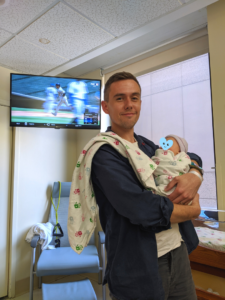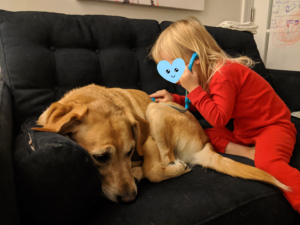Right now I’m adjusting to a new, uncomfortable normal. A day-to-day that looks, on the surface, much like what my father or grandfathers’ lives looked like. I’m working full-time while my wife focuses on child care.
Caregiving Equity: Belief vs. Reality
I believe that men and women should equally share in care work. I’m in the majority here: according to a study from New America, 80% of men and 91% of survey respondents share this belief. But only 46% of respondents reported that responsibilities actually are shared evenly. A recent Fortune piece examines the study (conducted in 2019) in the context of the cataclysmic life-and-work upheaval wrought by the pandemic.
 For the time being, my family is adding to those dismal labor equity statistics. This isn’t the best for us, but it is the best we’ve found for right now. We’re figuring out how to partner together in caring for our children in this new territory.
For the time being, my family is adding to those dismal labor equity statistics. This isn’t the best for us, but it is the best we’ve found for right now. We’re figuring out how to partner together in caring for our children in this new territory.
 Last November, I started a new full-time job. My wife left her pre-pandemic position around the same time, as they were pushing for more in-person work than she was comfortable doing—more than we honestly could fathom doing, with a very-much newborn to contend with as well. We were daunted by the prospect of finding child care for an infant during the pandemic and dreaded returning to the delirium of our early quarantine schedules. Presented with no perfect options, she chose to stay home.
Last November, I started a new full-time job. My wife left her pre-pandemic position around the same time, as they were pushing for more in-person work than she was comfortable doing—more than we honestly could fathom doing, with a very-much newborn to contend with as well. We were daunted by the prospect of finding child care for an infant during the pandemic and dreaded returning to the delirium of our early quarantine schedules. Presented with no perfect options, she chose to stay home.
Why the Disconnect?
What is the source of this massive disconnect between belief and reality—both in my own life, and in our culture at large? That’s a big, hairy question that I’ll leave to the sociologists and my therapist. But I can surmise some of the problem from my own experience.
Sure, I believe that partners should equally share in care work. But I’m also still fairly insecure about my ability to do so.
- Even though I had some caregiving experience, in every way, my partner had more. And she was obviously far more skilled than I was.
- I like to think of myself as adept, capable, self-sufficient. But in caregiving and as a new parent, I rarely felt that way.
- It’s uncomfortable trying to do something you think you’re not very good at. It’s even more uncomfortable to do it under the observation of someone who’s much better at the same thing.
- There’s also a less noble and psychologically fraught explanation: plenty of caregiving work is draining, thankless, and, quite simply, not fun.
So, given societal norms and a very capable partner, do I ever choose laziness over something both difficult and not fun? Yes. Very much yes.
Empowering Caregiving Experience
Through the coincidences and headlong stumbles called my “professional journey,” I accumulated a variety of child care experiences. Most (as a high school special education teacher and a college access counselor) are with “children” quite close to my own age. But a surprising amount of the lessons learned in these roles translated to parenting—even very young children.
From teaching, I learned to read the varied needs of both groups and individuals, and the crucial importance of providing structure and anticipating problems. I learned to plan, plan, and plan. And, when the plan inevitably collapsed in a crumpled heap, to react and adapt on the fly.
 In College Access, I learned to assume the best intentions of my staff and students, and how to coach someone through making their own decisions. (The best way to get either a 17 y/o or a 2 y/o to ignore you? Tell them exactly what you want them to do.)
In College Access, I learned to assume the best intentions of my staff and students, and how to coach someone through making their own decisions. (The best way to get either a 17 y/o or a 2 y/o to ignore you? Tell them exactly what you want them to do.)
This experience gave me some foundational confidence in caring for my children, which made me more open to splitting child care responsibilities with my wife. But it also meant I already understood what a grind it is to manage children.
More than anything, I learned these things: caring for children is more difficult and more doable — and more rewarding — than I could have ever imagined.
A Growth Challenge
Nothing in this past year went according to plan, including parenting and child care for my wife and me. While my schedule looks much like my grandfather’s, my kids’ experience of me as a caregiver doesn’t have to.
And what better time to commit to more equitable parenting than a holiday that otherwise reinforces traditional roles? For Mother’s Day this year, include something Hallmark doesn’t offer. Honor the most-loved mom in your life with a better partner or support system.
Consider this your 2021 growth challenge:
- To partners and parents looking to increase caregiving equity in your relationships (a.k.a all of us): get out of your comfort zone.
- To the primary caregivers: give your partners independence and opportunity (and realize their solutions will be different—at first, also worse).
- To non-parents and parents: protect parenting and caregiving.Recognize its value and difficulty—and appreciate expertise when you see it. Consider this in how you run teams at work, how you interact with other parents in your community, and even in how you vote.
Everyone benefits when children are raised by adults who are healthy, whole people, thriving as their full selves. No matter what “normal” looks like for them.
Luke Chitwood is a writer, non-profit professional, and education advocate based in Chicago. A beginner-level husband and father, you can find him wrangling words and images, in perpetual pursuit of his next cup of coffee.

